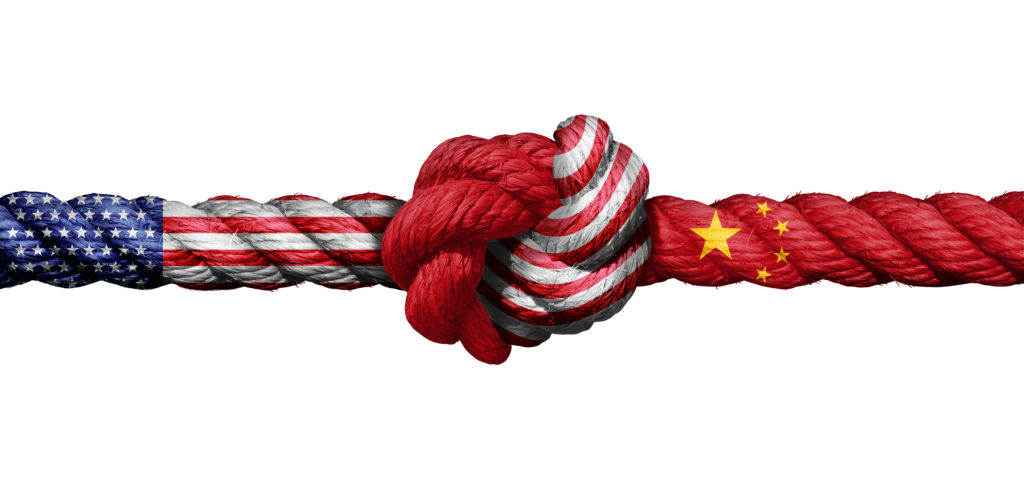Over the past few months, news stories about China, Huawei, and the United States’ ban on certain technology imports and services have been unavoidable. What’s going on, exactly? The issue is far more complex than meets the eye, but here are the basics of the Chinese-American tech Cold War.
What You Need to Know
On May 15, 2019, President Trump signed an executive order to, among other things, ban imports, installations, and uses of certain foreign technologies and services. Finding “that foreign adversaries are increasingly creating and exploiting vulnerabilities…in order to commit malicious cyber-enabled actions,” the White House believes that the elimination of these technologies will help mitigate a serious, exigent threat to national security. Though the ban is far-reaching, it’s thought to be not-so-subtly directed at one company in particular— Chinese tech giant Huawei Technologies Co.
Why Huawei? How is this company different from the rest? The answer is simple: reach. Huawei technology is the basis of a variety of products from smartphones to WiFi networks. US-based companies (and economic powerhouses) like Google, in fact, implemented their sophisticated, cutting-edge developments. Many Americans, whether they realize it or not, have used Huawei technology in one way or another.
Reach isn’t the only issue. Though they’ve escalated to a fever pitch in 2019, espionage accusations against Huawei have circulated for years. Suspicions toward the company are often attributed to its founder, Ren Zhengfei, a former engineer for the Chinese military. Zhengfei insists that Huawei is uninvolved with the Chinese government. Other nations, however, remain unconvinced.
Their worries aren’t unfounded— in 2017, for instance, the African Union Headquarters discovered that their Huawei servers had been sending classified information to Shanghai since 2012. Major nations across the world began to keep their distance in the wake of this discovery. Though Huawei is at the forefront of 5G innovation, both Australia and New Zealand barred the company from their developing 5G networks. Other tech companies are taking notice, too. In January 2019, Vodafone stopped implementing Huawei technology in all of their European markets. The United States may be at the center of the media firestorm, but the issue is worldwide.

Implications and Consequences
Unsurprisingly, the Chinese-American relationship is strained thanks to the ban. China, in a recent retaliation attempt, imposed a similar ban on US-based companies. These regulations aim to blacklist and punish companies that the Chinese government deems “unreliable” and harmful to their national interest. The Chinese government has yet to release official confirmation of which companies are on the list and what punishment entails. It’s widely believed, however, that these newly-blacklisted companies are those that have severed ties with Huawei.
If this blacklist comes to fruition, third-party nations are left with a difficult choice— should they do business with United States companies and alienate China, or should they do business with China and alienate the United States? What was once a business transaction now carries the implication of alliance, and uninvolved powers are caught in the crossfire.
The Chinese government has also threatened to cut off supplies of rare-earth metals to the United States. These 17 metals are the cornerstone of tech products like batteries, magnets, and even nuclear equipment. If barred from doing business with their number-one supplier, American manufacturers will have to find an alternative source of raw material. With scarcity increasing costs, the effect would likely be seen in companies’ bottom lines.
Perhaps most importantly, this standoff will impact the world economy as a whole. The United States has already imposed steep tariffs on $200 billion of Chinese goods, and, if the pattern continues, the US government will raise tariffs even more. Dai Xianglong, once a governor of the People’s Bank of China, notes that “if the China-U.S. trade war continues to grow longer it may cause the global economy to declines, and may cause a global financial crisis.”
What’s Next?
The tech Cold War is likely only beginning. Chinese-American relations are certainly strained, and experts have differing opinions on how long the tensions will last. The instability that comes from a trade war will likely slow investment and economic growth for the near future.
Wei Jianguo, the former Vice Minister of China’s Ministry of Commerce, indicates that tensions could last for decades. In a recent interview with CNBC, Wei Jianguo noted that “in the next 20 to 30 years, the U.S. shouldn’t miss out on this opportunity and lose the Chinese Market.”
James McGregor, a member of the United States’ Council on foreign relations, also believes that the trade war will last for the foreseeable future. In an article for New York Magazine, McGregor noted that “[his] guess is that in the long term it could be the United States because China is using this as a moment to focus and rally.”
President Trump and Chinese President Xi Jinping engaged in face-to-face negations in late June during the 2019 G-20 summit. Will policy change? We have yet to find out. The president stated he plans to make a decision in the near future, the outcome of which will likely be announced this summer.











